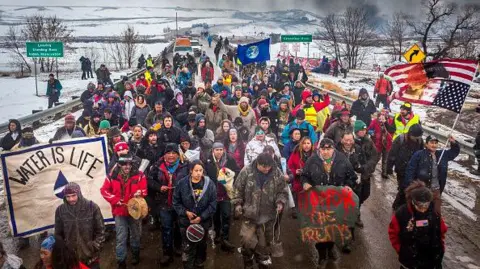Greenpeace risks bankruptcy at US pipeline trial
 Getty Images
Getty ImagesGreenpeace has said that a lawsuit brought by an energy company over the Dakota Access Pipeline could wipe it out.
The Texas-based company, Energy Transfer, alleges protest tactics by Greenpeace delayed the project, which began transporting oil in 2017 after President Donald Trump backed in his first term.
Protests against the pipeline near the Standing Rock Sioux Reservation drew thousands, but Greenpeace says it did not lead them and the lawsuit threatens free speech. The organisation "could face financial ruin, ending over 50 years of environmental activism" if it loses, it also says.
The trial in North Dakota is expected to last five weeks, beginning with jury selection on Monday.
The lawsuit, filed in state court, accuses Greenpeace of an "unlawful and violent scheme to cause financial harm to Energy Transfer, physical harm to its employees and infrastructure, and to disrupt and prevent Energy Transfer's construction of the Dakota Access Pipeline".
Greenpeace says it could be forced into bankruptcy if it is ordered to pay the approximate $300m (£237m) in claimed damages.
Energy Transfer brought a similar federal lawsuit in 2017, arguing protesters had violated the Racketeer Influenced and Corrupt Organizations Act (Rico) - an allegation more often made against organised crime groups. A judge dismissed the case.
But this trial is taking place in conservative North Dakota.
The state's former governor, Doug Burgum, is currently leading the federal agency on public lands for the Trump administration, as the secretary for the Department of Interior. Greenpeace has expressed concern that it cannot get a fair hearing in the oil-rich area.
The pipeline's construction gained international attention during Trump's first term as Native American groups set up an encampment trying to block it from passing near Standing Rock. The protests started in April 2016, and ended in February 2017, when the National Guard and police cleared the protest site.
At the peak, over 10,000 protesters were on site. The group included more than 200 separate Native American tribes, hundreds of US military veterans, actors and political leaders - including the current health secretary, Robert F Kennedy, Jr.
Hundreds were arrested, and authorities were accused of using excessive force, including dousing crowds with pepper spray and freezing water as well as firing sound cannons, bean-bag rounds and rubber bullets.
Lawyers for Greenpeace argue that it was not the leader of the protest group, but helped support "nonviolent, direct-action training" to protesters.
The suit names Greenpeace USA, as well as its Washington DC-based funding arm Greenpeace Fund Inc and its Amsterdam-based parent group Greenpeace International.
Greenpeace has sued Energy Transfer (ET) in Dutch court, claiming that the company is attempting to unfairly use the legal system to silence critics.
The lawsuit, filed earlier this month, seeks to recover "all damages and costs it has suffered as a result of ET's back-to-back, meritless lawsuits".
